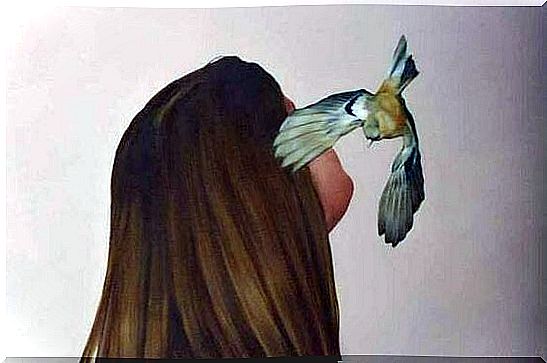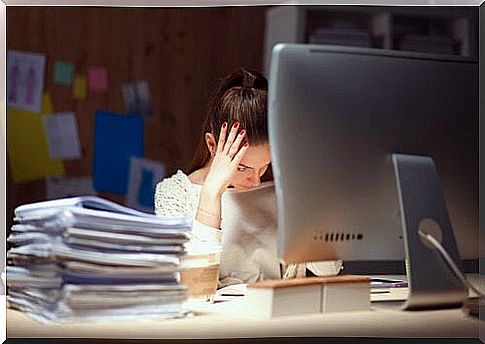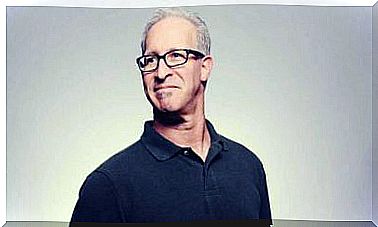3 Things Not To Do When We’re Anxious

There are some things we shouldn’t do when we’re anxious. We say to ourselves, “Calm down, relax and you’ll feel better.” We’ll be able to calm down for a few minutes, but then this terrible enemy will return to take our breath and our spirits. This is because anxiety is not a disease but a symptom, the echo of a pervasive, deep, formless problem that needs to be cleared up and managed.
We all know this feeling. It usually starts with pressure on the chest, as if the demon in Heinrich Füssli’s famous painting “The Nightmare” had come to take our vital energy. Later we will experience muscle pain, headache, digestive problems and insomnia.
In addition, we must not forget that physical symptoms are intensifying every day because of this lethal combination that forms distorted thoughts: negative thoughts and the feeling of constant threat. It doesn’t matter if we’re not doing any activities or if we’re on vacation: if our mind is stuck in this dark tunnel of fears and catastrophic thoughts, it’s no use trying to relax.
In those states, where a person is unable to reason clearly, there are many things that will not be helpful, even if we believe it. We can do yoga, we can paint mandalas, we can listen to music and go for a walk. Without a doubt, all of these activities are positive, relaxing and beneficial. But, these are temporary benefits that do not solve the original problem.
In fact, the successful treatment of anxiety processes lies in a multidisciplinary approach. Relaxation is very therapeutic, as is family support, sport and a balanced diet. However, we also need a cognitive-behavioral strategy that helps us reframe certain things and make changes.
Let’s see below how to face this reality in the best possible way, starting with some things we shouldn’t do when we’re anxious. These are dimensions that, as much as they surprise us, do not help to treat anxiety or to permanently remove it.

Things we shouldn’t do when we’re anxious
1. When something worries me I’ve learned not to run away or escape it
Ana works for a large company. She arrives every day at 8 am, however, a few weeks ago she started arriving late. The curious thing is that she leaves the house on time, but when she is about to enter the highway that will take her to her place of work, she returns and goes to a coffee shop. There, she drinks tea and tells herself that for an hour she won’t think about anything: she just wants to relax.
As we can deduce from this small example, what our protagonist does is “escape” from the root of the problem. She feels unable to go to work. So, what can start with a delay in your entry time, can lead to low performance at work because pressure, fear and anxiety will make you unable to fulfill your responsibility.
What is the correct way to act in these cases?
These reactions are completely normal for a very simple reason: when our brain senses a threat, it triggers the release of cortisol to prepare our bodies for flight or fight.
- The problem with avoidance is that it worsens anxiety over time, it ends up getting bigger.
- Likewise, when we repeat this avoidance behavior, we see ourselves as incapable of handling the situation. Therefore, this fear becomes even more threatening.
- Rather than running away, avoiding, or distracting ourselves with other things so as not to think about what concerns us, a useful strategy in these cases is to rationalize the situation through questions that would start with a “what if…?”
-What would happen if I told my boss that I don’t like this and that?
-What would happen if my boss agreed with me and my work situation improved?
-What would happen if I lost my job?
-What would happen if I devoted all my efforts to finding a job that matched my potential?

2. I must not feed ruminant thoughts
Constant obsessive worry is the cognitive component of anxiety. One of its worst side effects is robbing us of the capacity for reflection, the power to calmly analyze things through more logical and useful perspectives. Therefore, it is necessary to take into account these dimensions:
- When something worries me, scares me, or bothers me, the mind has a natural tendency to create a chaotic epicenter with all these negative focuses. Slowly, negative emotions arise and this sense of threat will further intensify the worry.
- One way to stop this vicious circle or this snake that bites its own tail is to become aware of the situation and stop it.
- In these cases, progressive relaxation exercises are very important, as well as diaphragmatic breathing. However, we must remember that they are helpful in relieving symptoms such as muscle tension and internal restlessness.
- Only when we realize that our bodies are more relaxed and our minds clearer, will we begin to break the negative thinking cycle to find new options. We’ll make some suggestions, we’ll focus on the present instead of anticipating things that haven’t happened yet.

3. Denying anxiety or wanting to completely erase it doesn’t make sense
We need to understand that it makes no sense to want to erase anxiety from our lives. It will always be there, because it is part of the human being, and as curious as it may seem, it is also useful for our survival and for us to adapt to the environment where we live.
To better understand, reflect for a moment on these ideas:
- We can live with our anxiety if we don’t turn it into our enemy.
- The best way to deal with anxiety is to allow it to stay with us, but to watch it closely, control it and anticipate its triggers. If we don’t, it will automatically take over without us realizing it.
- We will realize that our anxiety is negative when it is blocking and limiting our life, affecting in some way, however small, our relationships and work performance.
In turn, positive anxiety can act as an authentic psychological craft. It is she who invites us to improve, to anticipate risks to solve them in the best way, to see opportunities to take advantage of them to their full potential, to free ourselves from laziness and passivity to transform ourselves into beings capable of conquering our goals.
As we have seen, there is no single way to deal with and manage anxiety; there are many paths. However, it all starts with understanding that anxiety is the mind wanting to go faster than life. Let’s slow down a bit and start talking to ourselves.









